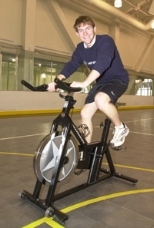Three students hit the road on June 10 for a 3,500-mile cross-country cycling trip, hoping to raise $25,000 for the American Cancer Society.
The team had $10,000 in pledges before taking off on what they hope will be a fun road trip with plenty of new friends along the way. Some of those friends are cancer survivors or family and friends of MIT friends who have offered to let the three men stay with them when they pass through.
The students--Kyle Rattray, now a junior in brain and cognitive sciences; Greg Mahowald, a graduate student in electrical engineering and computer science; and Taku Iida, now a junior in mathematics--loaded their bikes with supplies and headed for the New York border where they'll take Route 5 in northern New York state to Ontario and then go through Michigan, Wisconsin, South Dakota, Montana, Wyoming, Idaho and finally Rattray's home state of Washington.
Rattray, who survived cancer as a child, plans to send weekly updates on the group's travels to the MIT News Office, which will post them on the web. If you'd like to keep up with the team's progress, check out http://web.mit.edu/news regularly this summer for Rattray's reports and photographs. To see the route map and towns where they need places to stay, go to http://web.mit.edu/cancer/trip.htm. You can also make a pledge at that site.
"We are asking for flat donations, sponsors by mile or by day, or whatever other clever thing people want to donate by--number of blown tires, Powerbars eaten, etc.," said Rattray, who asks that people seeking more information contact him by e-mail at ratt@mit.edu.
A version of this article appeared in MIT Tech Talk on June 12, 2003.






